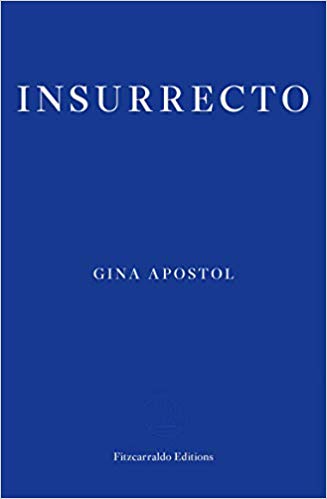Gina Apostol: Insurrecto review – a treacherous archipelago of stories | reviews, news & interviews
Gina Apostol: Insurrecto review – a treacherous archipelago of stories
Gina Apostol: Insurrecto review – a treacherous archipelago of stories
Tragic Filipino history inspires a smart but overwrought novel

As in other countries born out of 19th-century uprisings against imperial power, the literary roots of the Philippines run deep. Executed by the Spanish in 1896, the novelist, poet and physician José Rizal remains the adored hero of his archipelago’s struggle for independence. Yet this legacy of authored nationhood has not helped Filipino writers much in their quest to have their stories heard abroad.
A handful of British writer-adventurers (especially Timothy Mo and James Hamilton-Paterson) have written powerfully about the tangled weave of the islands’ cultures, but only as fascinated outsiders. Then, a decade ago, the global acclaim achieved by Miguel Syjuco’s carnivalesque novel Ilustrado marked a breakthrough. Ilustrado sent a young, US-based researcher back to the Philippines on a quest to uncover the story of an exiled literary lion, and to understand in polyphonic prose the hybridised place that had nurtured him. In the same vein, the Filipino-born, US-domiciled novelist Gina Apostol draws on the over-written nature of Filipino history and identity – “overdubbed, multiplied, intercut and hyperlinked”. From this layered material she stitches a sophisticated, self-reflexive tragi-comedy, adorned with a glittering array of metafictional games and postmodern conceits. In Insurrecto, three key periods of the islands' history interact and overlap: the insurrection and subsequent war against US occupation in the early 1900s; the Marcos dictatorship of the 1970s; and the media-savvy authoritarianism of Rodrigo Duterte and his "war on drugs" today. They join in a multi-perspectival plot about “a crime of history that no single vision can redeem”.
This triple action wraps – sometimes, arguably, smothers – the blood-stained horrors of Filipino history in a tightly-knotted web of storytelling strands. In the present day, an American film-maker, Chiara Brasi, visits the Philippines to research a project inspired by the unexplained disappearance of her father – the cult art-house director Ludo Brasi – on location in the islands in the 1970s. The movies planned by father and daughter, four decades apart, both turn on the Balangiga massacres of 1901. In this colonial-era atrocity, the killing by Filipino rebels of 48 US troops on the island of Samar provoked drastic and indiscriminate reprisals from the occupiers. Their campaign of scorched-earth vengeance saw thousands of local people slaughtered. Apostol quotes a figure of 30,000; other sources cite 2,500. It was an American crime against humanity, by any measure. The demonic US general Jacob Smith even decreed that Samar “must be made a howling wilderness”.
 Apostol can write with electrifying intensity about a peculiarly Filipino cocktail of beauty and terror, both in the past and the present. Immersive passages about the preparations for the insurgents’ raid (dressed in women’s clothes) on the diseased, depressed American troops, or the sinister patrols of thuggish cops on today’s tropical highways, shimmer, glow and burn. The writing swerves at breakneck pace between farce and tragedy, lavish sensuality and wisecracking erudition. Along the way, Insurrecto evokes the Philippines equally as “a dystopia of brazen exterminations”, an accursed place caught in “an infinite spiral of historic slaughter”, and a funhouse hall of mirrors where cultures reflect and distort one another in a delirious imitation game. Scatty, punning humour and affectionate intimacy enliven the scenes among the Elvis- and Muhammad Ali-loving family of Chiara’s translator Magsalin. They may be culturally colonised Filipinos, yes, but also folk who show “how beautiful is imitation… when its vessel breaks the heart”.
Apostol can write with electrifying intensity about a peculiarly Filipino cocktail of beauty and terror, both in the past and the present. Immersive passages about the preparations for the insurgents’ raid (dressed in women’s clothes) on the diseased, depressed American troops, or the sinister patrols of thuggish cops on today’s tropical highways, shimmer, glow and burn. The writing swerves at breakneck pace between farce and tragedy, lavish sensuality and wisecracking erudition. Along the way, Insurrecto evokes the Philippines equally as “a dystopia of brazen exterminations”, an accursed place caught in “an infinite spiral of historic slaughter”, and a funhouse hall of mirrors where cultures reflect and distort one another in a delirious imitation game. Scatty, punning humour and affectionate intimacy enliven the scenes among the Elvis- and Muhammad Ali-loving family of Chiara’s translator Magsalin. They may be culturally colonised Filipinos, yes, but also folk who show “how beautiful is imitation… when its vessel breaks the heart”.
Yet, in the end, Insurrecto’s laborious avant-garde scaffolding of films within films, scripts within scripts, yarns boxed inside one another, exhausts more than it enlightens. The sudden shifts between the generations of Chiara, of Ludo, and of the fictitious Yankee photographer Cassandra Chase (whose camera witnesses the tragedies of Balangiga) eventually begin to pall. This frantic movement drains the colour from each panel in the fictional triptych. Punishingly often, Apostol whisks us behind the scenes, behind the lens, to explain the function of key characters, while Magsalin tries to rewrite Chiara’s screenplay to express “the eye of the colonised viewing their captured history in the distance created by time”. Magsalin accuses her theory-hungry younger self of “a surplus of academic desire”. You might say the same of Insurrecto itself, with its weakness for knowing postgrad in-jokes – particularly when 17 pages of end-notes rattle off a facetious routine of pseudo-scholarly gags. This dragging coda reminded me more of the campus drollery of David Lodge or Malcolm Bradbury than the wizardry of Georges Perec or Julio Cortázar (two of the pioneer metafictionists whose work has evidently cast a spell on Apostol).
Insurrecto assumes that, on these islands scarred by the historical clash of rival narratives, where all identities are “irremediably mediated”, no single account will ever suffice. As two generations of post-Márquez, post-Rushdie novelists have shown us, fiction from the ex-imperial world will often split, branch and fracture into an inter-connected archipelago of stories if it seeks to do justice to the voices formerly silenced by the languages of power.
Beyond doubt, Insurrecto sticks smartly, and very self-consciously, to the script of this post-colonial post-modernism (should we call it Poco-Pomo?). For this reader, however, Apostol’s novel truly takes wing when it leaves its tricksy architecture behind to grapple more viscerally, more nakedly, with the tainted inheritances of the Filipino past. Magsalin feels that the Balangiga outrages remain “a story of war and loss so repressed and so untold”. And, at times, I felt that Apostol’s most subversive option would have been to dump all the professor-pleasing riffs about mirrors or recurrences and tell that story as a broadly realistic slice of historical fiction to touch, to shock and to warn. As Magsalin herself says, “what the fuck is the point of knowing history’s goddamned repetitive spirals if we remain its bloody victims?”
- Insurrecto by Gina Apostol (Fitzcarraldo Editions, £12.99)
- Read more book reviews on theartsdesk
rating
Explore topics
Share this article
The future of Arts Journalism
You can stop theartsdesk.com closing!
We urgently need financing to survive. Our fundraising drive has thus far raised £49,000 but we need to reach £100,000 or we will be forced to close. Please contribute here: https://gofund.me/c3f6033d
And if you can forward this information to anyone who might assist, we’d be grateful.

Subscribe to theartsdesk.com
Thank you for continuing to read our work on theartsdesk.com. For unlimited access to every article in its entirety, including our archive of more than 15,000 pieces, we're asking for £5 per month or £40 per year. We feel it's a very good deal, and hope you do too.
To take a subscription now simply click here.
And if you're looking for that extra gift for a friend or family member, why not treat them to a theartsdesk.com gift subscription?
more Books
 'We are bowled over!' Thank you for your messages of love and support
Much-appreciated words of commendation from readers and the cultural community
'We are bowled over!' Thank you for your messages of love and support
Much-appreciated words of commendation from readers and the cultural community
 Thomas Pynchon - Shadow Ticket review - pulp diction
Thomas Pynchon's latest (and possibly last) book is fun - for a while
Thomas Pynchon - Shadow Ticket review - pulp diction
Thomas Pynchon's latest (and possibly last) book is fun - for a while
 Justin Lewis: Into the Groove review - fun and fact-filled trip through Eighties pop
Month by month journey through a decade gives insights into ordinary people’s lives
Justin Lewis: Into the Groove review - fun and fact-filled trip through Eighties pop
Month by month journey through a decade gives insights into ordinary people’s lives
 Joanna Pocock: Greyhound review - on the road again
A writer retraces her steps to furrow a deeper path through modern America
Joanna Pocock: Greyhound review - on the road again
A writer retraces her steps to furrow a deeper path through modern America
 Mark Hussey: Mrs Dalloway - Biography of a Novel review - echoes across crises
On the centenary of the work's publication an insightful book shows its prescience
Mark Hussey: Mrs Dalloway - Biography of a Novel review - echoes across crises
On the centenary of the work's publication an insightful book shows its prescience
 Frances Wilson: Electric Spark - The Enigma of Muriel Spark review - the matter of fact
Frances Wilson employs her full artistic power to keep pace with Spark’s fantastic and fugitive life
Frances Wilson: Electric Spark - The Enigma of Muriel Spark review - the matter of fact
Frances Wilson employs her full artistic power to keep pace with Spark’s fantastic and fugitive life
 Elizabeth Alker: Everything We Do is Music review - Prokofiev goes pop
A compelling journey into a surprising musical kinship
Elizabeth Alker: Everything We Do is Music review - Prokofiev goes pop
A compelling journey into a surprising musical kinship
 Natalia Ginzburg: The City and the House review - a dying art
Dick Davis renders this analogue love-letter in polyphonic English
Natalia Ginzburg: The City and the House review - a dying art
Dick Davis renders this analogue love-letter in polyphonic English
 Tom Raworth: Cancer review - truthfulness
A 'lost' book reconfirms Raworth’s legacy as one of the great lyric poets
Tom Raworth: Cancer review - truthfulness
A 'lost' book reconfirms Raworth’s legacy as one of the great lyric poets
 Ian Leslie: John and Paul - A Love Story in Songs review - help!
Ian Leslie loses himself in amateur psychology, and fatally misreads The Beatles
Ian Leslie: John and Paul - A Love Story in Songs review - help!
Ian Leslie loses himself in amateur psychology, and fatally misreads The Beatles
 Samuel Arbesman: The Magic of Code review - the spark ages
A wide-eyed take on our digital world can’t quite dispel the dangers
Samuel Arbesman: The Magic of Code review - the spark ages
A wide-eyed take on our digital world can’t quite dispel the dangers
 Zsuzsanna Gahse: Mountainish review - seeking refuge
Notes on danger and dialogue in the shadow of the Swiss Alps
Zsuzsanna Gahse: Mountainish review - seeking refuge
Notes on danger and dialogue in the shadow of the Swiss Alps

Add comment